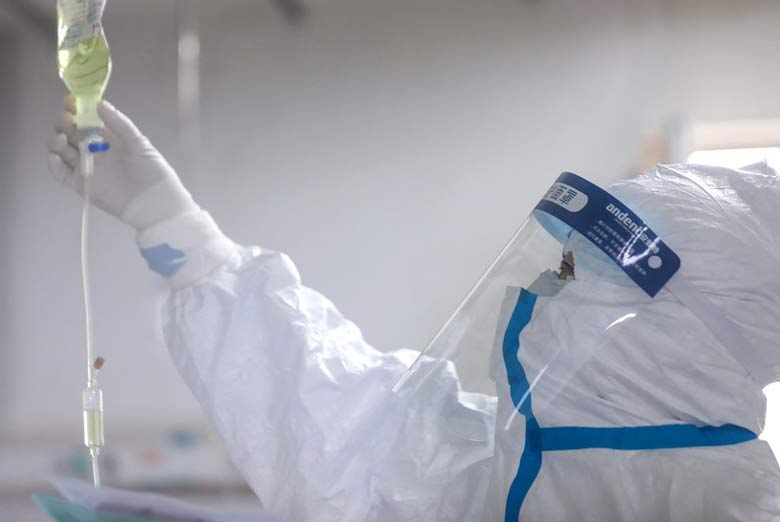PROTOCOL FOR ENSURING THE WELFARE OF HEALTH CARE WORKERS IN COVID-19 RESPONSE

LAGOS STATE MINISTRY OF HEALTH
HEALTH FACILITY MONITORING AND ACCREDITATION AGENCY
PROTOCOL FOR ENSURING THE WELFARE OF HEALTH CARE WORKERS IN COVID-19 RESPONSE
Health care workers are at the front lines of any outbreak response and as such are exposed to hazards that put them particularly at risk of infection during disease outbreaksincludingCOVID-19.
This document highlights the rights and responsibilities of health care workers, including specific measures needed to protect their safety and health.
Health care workers’ rights include that employers and managers in health facilities ensure the following:
- Assume overall responsibility to ensure that all necessary preventive and protective measures are taken to minimize their safety and health risks;
- Provide information, instruction and training on occupational safety and health, including;
- Refresher training on infection prevention and control (IPC); and
- Use, putting on, taking off and disposal of personal protective equipment (PPE);
- Provide adequate IPC and PPE supplies (medical masks, gloves, goggles, gowns, hand sanitizer, soap and water, cleaning supplies) in sufficient quantity to healthcare or other staff corresponding to their risk of exposure to COVID-19, to ensure that workers do not incur expenses for occupational safety and health requirements;
- As needed, provide appropriate security measures for personal safety of health care workers;
- Provide a blame-free environment for health care workers to report – incidents, such as exposures to blood or bodily fluids from the respiratory system or to cases of violence, and to adopt measures for immediate follow-up, including support for victims;
- Advise health care workers on self-assessment, symptom reporting and staying home when ill;
- Allow health care workers to exercise the right to remove themselves from a work situation that they have reasonable justification to believe presents an imminent and serious danger to their life or health. When a health care worker exercises this right, they shall be protected from any repercussions;
- Honour the right of health care workers to compensation, rehabilitation and curative services if infected with COVID-19 following exposure in the workplace. This would be considered occupational exposure and resulting illness would be considered an occupational disease;
- Provide access to mental health and counselling resources: Health care workers should be regularly encouraged during this – stressful period.
- Set up a COVID-19 Response Team to ensure the following:
- Classify health care workers according to their risk of exposure to COVID-19 (low and high).
| High Risk | Low Risk |
|
|
Where possible, a team of health care workers should be designated to care exclusively for suspected cases to reduce the risk of transmission.
- Ensure effective rotation of staff and maintain appropriate working hours with breaks.
- Check on/monitor the high risk group at least twice a day and low risk group at least once a day e.g follow up calls / sending of text messages can be used to ask about their welfare.
- Regularly monitor the development of any symptoms among health care workers.
- If the case definition for COVID-19 is met and the health care worker is a suspected case, isolate the health care worker and institute appropriate referral to Lagos State COVID-19 designated isolation and treatment facilities. Family members and contacts of the suspected case should also be traced, isolated and referred according the Lagos State Ministry of Health Protocol.
- Regularly contact and follow up infected health care workers while under isolation and treatment.
- Ensure general temperature check and screening patients and visitors for symptoms of acute respiratory illness (e.g fever, cough and difficulty breathing) at the facility’s entrance.
- Conduct an inventory of available PPE to ensure adequate supplies.
- Routinely clean and disinfect surfaces – which the patients come- in contact with.
Health care workers should:
- Follow established occupational safety and health procedures, avoid exposing others to health and safety risks and participate in employer-provided occupational safety and health training;
- Ensure proper use of personal protection equipment: use a medical mask (N95 respirator), gloves, clean, non-sterile, long-sleeved gown and wear eye protection (goggles) or facial protection (face shield) to avoid contamination of mucous membranes. Put on, use, take off and dispose of personal protective equipment properly;
- Use provided protocols to assess, triage and treat patients;
- Perform hand hygiene after contact with respiratory secretions: hand hygiene includes either cleansing hands with an alcohol-based hand rub or with soap and water;
- Refrain from touching eyes, nose, or mouth with potentially contaminated gloved or bare hands;
- Practice social distancing principle;
- Swiftly follow established public health reporting procedures of suspect and confirmed cases to the Lagos State Ministry of Health;
- Self-monitor for signs of illness and self-isolate or report illness to managers, if it occurs;
- Advise management if they are experiencing signs of undue stress or mental health challenges that require support interventions; and
- Report to their immediate supervisor any situation which they have reasonable justification to believe presents an imminent and serious danger to life or health.
